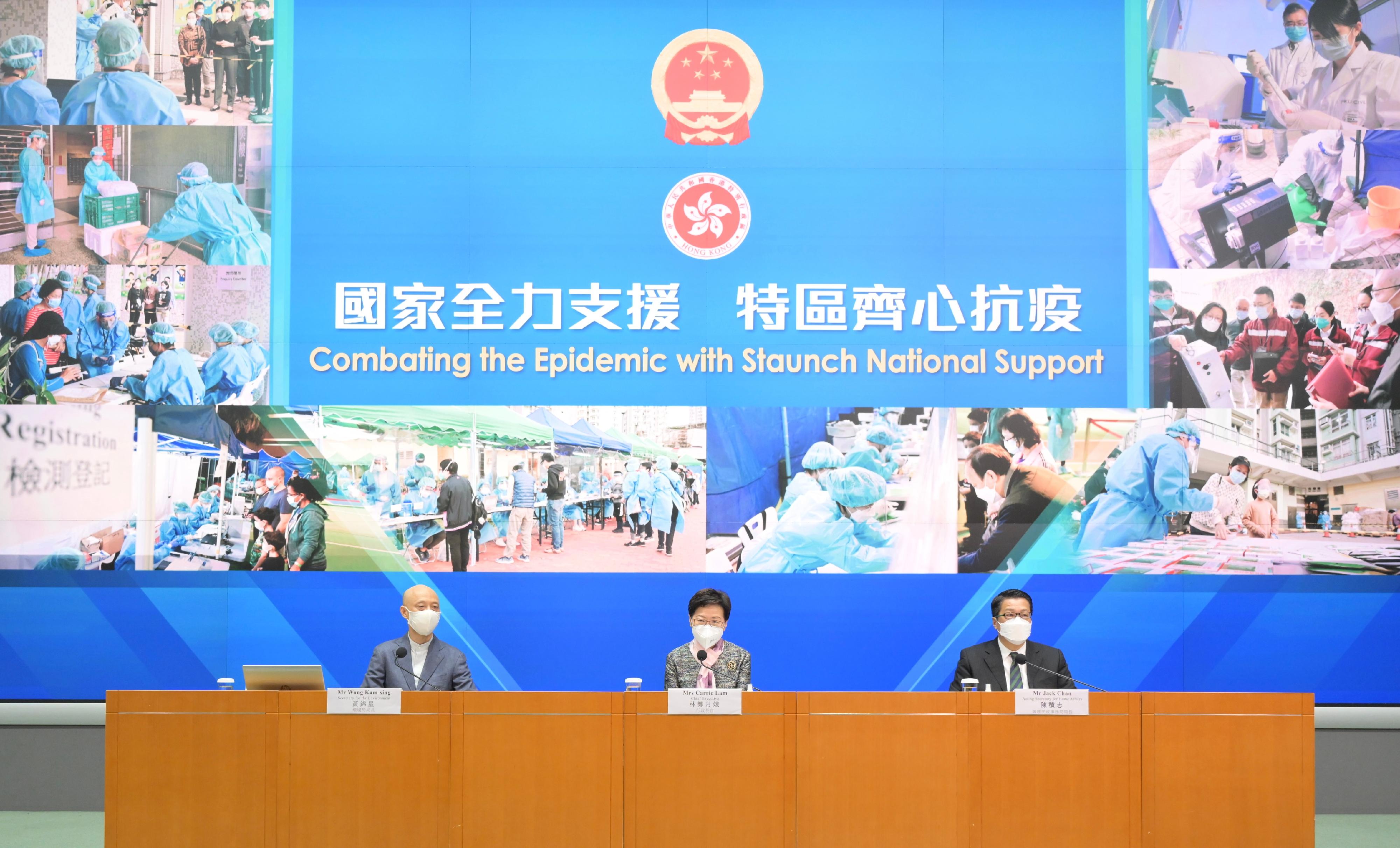Transcript of remarks of press conference on anti-epidemic measures (with photo/video)
**************************************************************************************
Reporter: Mrs Lam, why have the government policies been reactive rather than forward-looking, especially in terms of the cap on private household gatherings being implemented only after the Chinese New Year holiday, and potential changes to quarantine and flight bans only after massive brain drain and when Hong Kong's international status was at stake? And is there a road map for resuming normal living in the near future or will all scheduled premises need to wait until at least after April 20 to reopen? Thank you.
Chief Executive: A few days ago, I think it's on Thursday (March 17), I did acknowledge that although I said on February 22 that all the control measures that were put in place, whether it's border control or social distancing or the suspension of face-to-face learning or class education, will last until April 20, because nobody would imagine at that point in time that this very unprecedented fierce fifth wave would subside within a short period. But having gone through a month and having gone through the peak that you have seen here, I think a responsible government should regularly and vigorously review these measures to see whether there is room for adjustment. I wouldn't promise now that there is room for adjustment, but following a review we have the duty to account for the findings in this review and the direction that we will take. So you will have to wait until probably tomorrow when I present the findings of our one-month review of the implementation of the various measures.
I wouldn't readily accept that we are always lagging behind and not forward-looking. As the Secretary for the Environment has illustrated to you, the extensive use of sewage testing is a very forward-looking measure, so instead of waiting for residents to be infected and then identified, isolated and treated, on a very massive scale, we are surveilling the sewage of 5 million people for the last one and a half years. It's costing quite a lot of money, I can tell you, but this is money worth spending in order to have a very good picture of Hong Kong's virus situation.
The brain drain is caused by a lot of factors, and Hong Kong has gone through various stages of the so-called brain drain or the loss of talents. But at the same time we are also bringing in talents. I've been giving you figures under the Quality Migrant Admission Scheme where we have to double the annual quota twice in two years. That proves that Hong Kong remains very attractive on a medium- to long-term basis because of the abundant opportunities available to us under the 14th Five-Year Plan, under the Guangdong-Hong Kong-Macao Greater Bay Area. Inevitably, some people will take a shorter-term view that they are worried they could not travel, they are not happy their kids could not go to school, and so on. But this is Hong Kong - we have the freedom of movement and people come in and go out as often as they would like.
I don't know whether I heard you accurately - you said we were late in putting in place the social-distancing measures after the Chinese New Year. That was not accurate. We announced and put in place very severe and the most stringent social-distancing measures on January 7, and if you look at the chart, what happened on January 7 was only a handful of cases. And at that time I was being criticised and attacked for being sort of exaggerating the virus situation. The scheduled premises were all closed from January 7, except the barber shops and hair salons, and evening dine-in was suspended from January 7. That was well before the Chinese New Year, which fell on February 1. I'm very happy to answer questions, but you have to possess the facts in asking questions, if I heard you accurately. This is again not a factually accurate comment, and it's duty-bound for me to clarify. This has proven to be absolutely necessary. Although judging from the confirmed cases, people are still worried whether we have been effective, but if you will just imagine if we had not put in the social-distancing measures, people still went out as frequently as they would like, they still had banquets and social interactions and so on, we could be facing a far worse situation. The intervening Chinese New Year has been most unfortunate for Hong Kong because despite all the warnings from myself and the Secretary for Food and Health and all the social-distancing measures, the reality is during the Chinese New Year there had been a lot of cross-family gatherings and as a result this highly transmissible Omicron was spreading like fire. But now I hope that at least we could have seen the peak of the infections passed and it is for us to remain as vigilant as possible and try to suppress the epidemic as soon as possible. And when we are in a better position to assess the likely outcome of the wave, I have promised that we would devise a road map in anticipation of a future wave, whether it's COVID-19 or another virus. Thank you.
(Please also refer to the Chinese portion of the transcript.)
Ends/Sunday, March 20, 2022
Issued at HKT 14:07
Issued at HKT 14:07
NNNN





